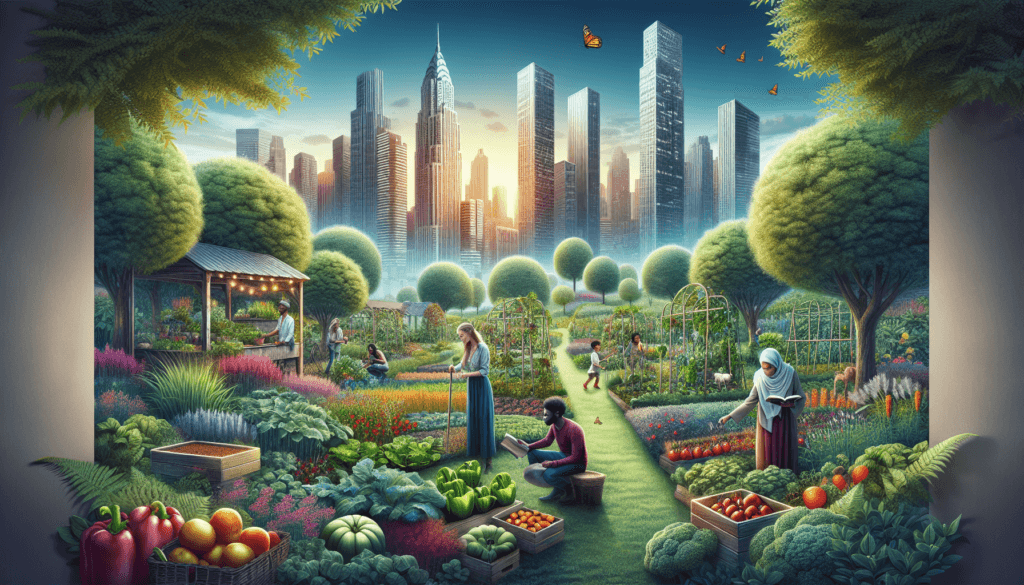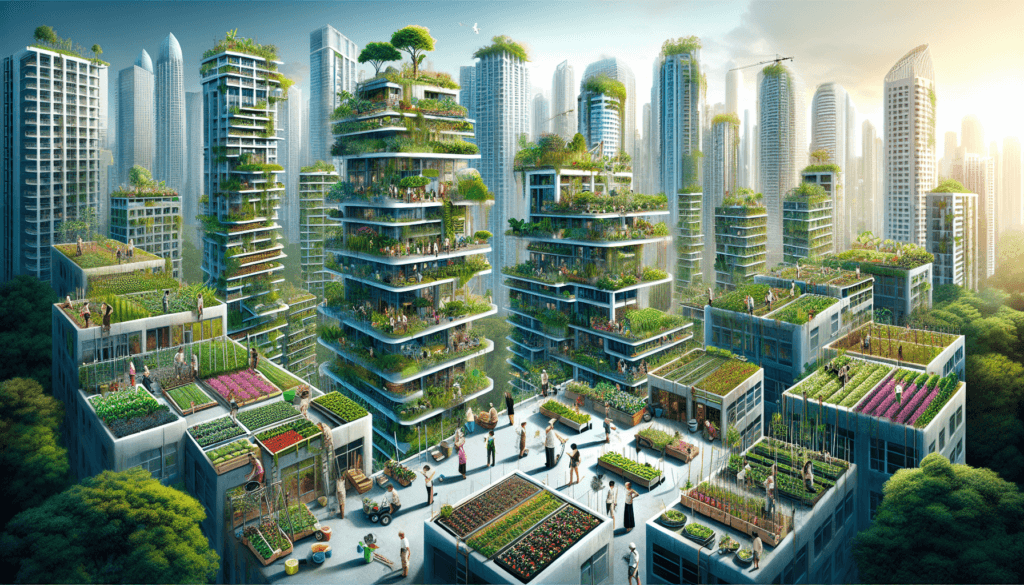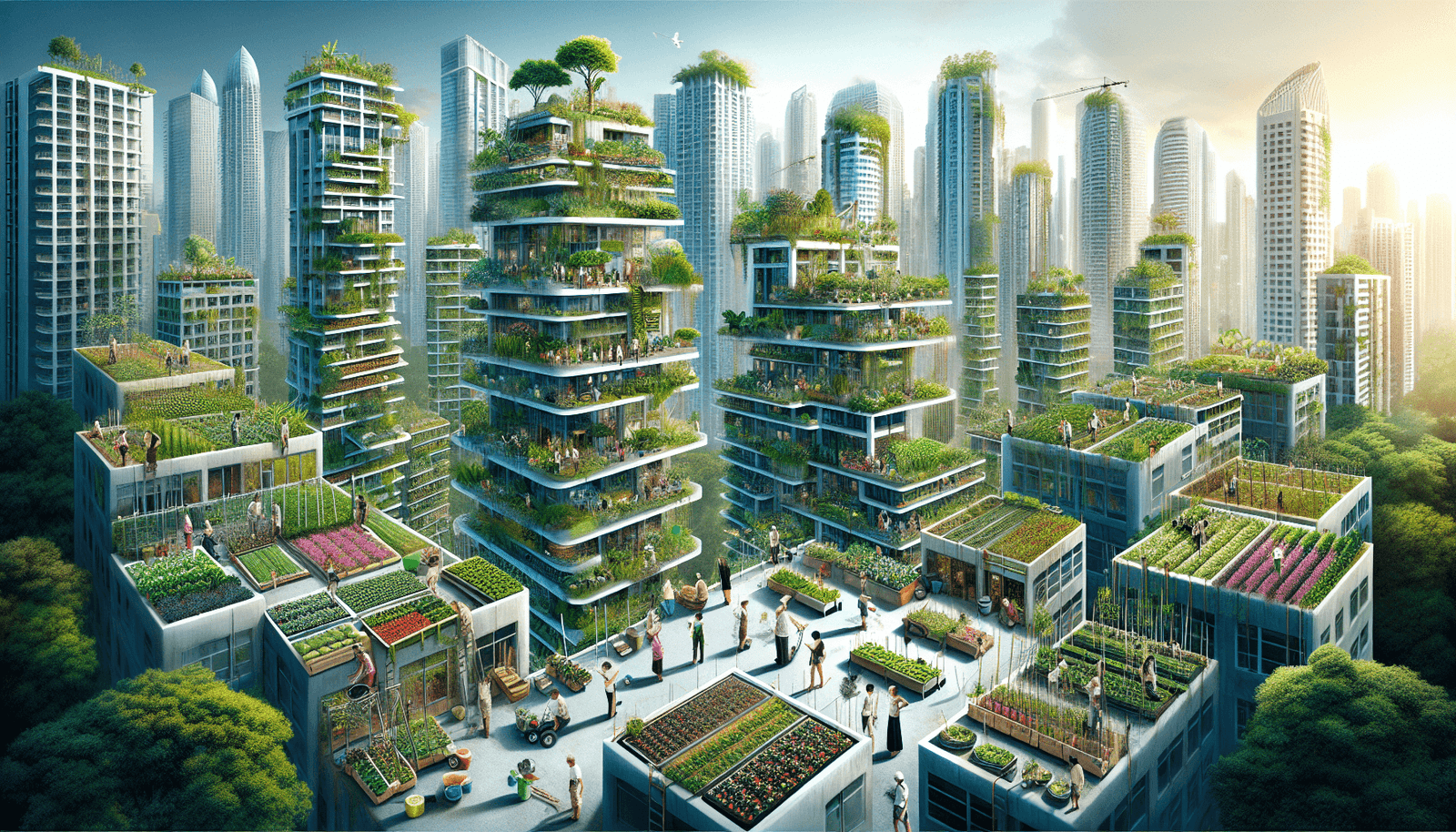Have you ever wondered how urban gardens can positively impact people’s lives? Urban gardens, often nestled in the heart of bustling cities, serve as oases of greenery and are transforming the way people connect with nature and their communities. From promoting physical and mental well-being to fostering a sense of belonging and food security, urban gardens have emerged as powerful tools for empowerment. In this article, we will explore the various ways in which these vibrant spaces benefit individuals and communities, ultimately reshaping the urban landscape for the better.

Improves Access to Fresh and Nutritious Food
Increases availability of fresh produce in urban areas
Urban gardens play a crucial role in increasing the availability of fresh produce in urban areas. Often, cities lack access to fresh and nutritious food, with supermarkets and grocery stores being situated far away or being expensive. Urban gardens provide a solution to this problem by bringing fresh fruits, vegetables, and herbs directly to the communities that need them. By growing food locally, urban gardens reduce the distance that the produce needs to travel, ensuring that it reaches consumers in the freshest state possible.
Reduces dependence on processed foods
Processed foods are notorious for their high levels of unhealthy fats, sugars, and preservatives. However, in many urban areas, processed foods are the only option available due to limited access to fresh food sources. Urban gardens provide an alternative by allowing individuals and communities to grow their own food. By growing their own fruits and vegetables, people can reduce their dependence on processed foods and instead enjoy a diet rich in fresh, nutritious produce.
Promotes healthy eating habits
One of the greatest benefits of urban gardening is the promotion of healthy eating habits. When you have a garden in your backyard or even a small balcony, you are more likely to incorporate fresh produce into your meals. Having access to a variety of fruits and vegetables encourages you to experiment with new recipes and flavors, making your meals not only tasty but also nutritious. By gardening and consuming the food you grow, you are more likely to adopt a well-balanced diet, leading to improved overall health and well-being.
Enhances Mental and Emotional Well-being
Provides a therapeutic and stress-relieving activity
Gardening has been proven to have numerous mental health benefits. Engaging in gardening activities, such as planting seeds, nurturing plants, and watching them grow, provides a therapeutic and stress-relieving experience. The act of connecting with nature and caring for plants can help reduce stress, anxiety, and depression. Taking a break from the hustle and bustle of daily life to spend time in your own garden can be a calming and meditative activity that allows you to recharge and rejuvenate your mind.
Creates a sense of accomplishment and fulfillment
Watching your plants thrive and grow under your care can also bring a sense of accomplishment and fulfillment. The process of turning seeds into flourishing plants can create a deep sense of satisfaction and pride. Whether it’s harvesting your own vegetables for a meal or simply seeing a flower bloom, the small victories in a garden can boost your self-esteem and provide a sense of purpose. This sense of accomplishment can have a positive impact on your mental well-being, contributing to improved overall happiness and life satisfaction.
Offers a connection to nature
Living in urban environments often means being surrounded by concrete and buildings, with limited opportunities to connect with nature. Urban gardens offer a way to bring nature back into your life. From the scent of fresh soil to the sound of birds chirping, gardening allows you to experience the joys of nature firsthand. Engaging with the natural world can create a deeper sense of connection and appreciation for the environment, leading to enhanced mental and emotional well-being.

Encourages Physical Activity
Requires physical effort for gardening tasks
Urban gardening is not just about growing plants; it also involves physical labor. Planting, weeding, watering, and harvesting all require physical effort and movement. By engaging in these gardening tasks, you incorporate physical activity into your daily routine. Gardening can be a great way to get exercise without feeling like you’re doing traditional workouts. Whether it’s digging, lifting, or bending, these movements help improve strength, flexibility, and cardiovascular health.
Promotes outdoor exercise
In today’s technology-driven world, many people spend a significant amount of time indoors, leading to a sedentary lifestyle. Urban gardening provides a compelling reason to step outside and enjoy the benefits of outdoor exercise. The fresh air and sunlight that you experience while gardening can have a positive impact on your mood and overall well-being. Whether it’s walking to your garden plot or tending to your plants, gardening encourages you to embrace the outdoors and engage in physical activity.
Supports a more active lifestyle
Incorporating urban gardening into your daily routine can help promote a more active lifestyle overall. By spending time in your garden, you are more likely to be engaged in physical activity regularly. This increased activity can have numerous health benefits, including weight management, improved cardiovascular health, and increased energy levels. Additionally, the regular physical activity associated with gardening can contribute to better sleep patterns, further enhancing your overall well-being.
Fosters Community Engagement
Creates a space for social interaction
Urban gardens have the power to bring people together and create a sense of community. They provide a shared space where individuals from different backgrounds can come together and connect over a common interest: gardening. Whether it’s swapping gardening tips, sharing surplus produce, or simply enjoying each other’s company while working in the garden, urban gardens foster social interaction and create opportunities for meaningful connections.
Builds relationships among neighbors and community members
By gardening in a communal space, individuals have the opportunity to build relationships with their neighbors and fellow community members. Sharing gardening knowledge, helping each other with gardening tasks, or organizing community events and workshops can foster a sense of camaraderie and promote a supportive community. Urban gardens become a hub for socializing, where people can meet, communicate, and form lasting friendships.
Encourages collaborative efforts
Urban gardens often require collective effort and collaboration to maintain and thrive. Whether it’s organizing regular workdays, sharing tools and resources, or collectively planning for the garden’s future, community members are encouraged to collaborate and work together. These collaborative efforts not only strengthen the community but also promote a sense of ownership and pride in the garden. By working alongside one another, individuals develop a shared sense of responsibility and invest in the success of the garden as a whole.

Contributes to Environmental Sustainability
Reduces carbon footprint by sourcing food locally
One of the significant environmental benefits of urban gardens is their contribution to reducing carbon footprints. By growing food locally, urban gardens eliminate the need for long-distance transportation, which often involves the burning of fossil fuels. When you consume food that you have grown in your garden, you are minimizing the environmental impact associated with the transportation, packaging, and processing of food. This reduction in carbon emissions contributes to a more sustainable and eco-friendly lifestyle.
Improves air quality in urban areas
Urban areas are often plagued by poor air quality, with high levels of pollutants and toxins. However, urban gardens have the potential to improve air quality by acting as natural air purifiers. Plants are known to absorb carbon dioxide and release oxygen through the process of photosynthesis. By increasing the number of plants in urban areas through gardens, the overall air quality can be enhanced, making cities a healthier and more livable environment for residents.
Increases green spaces and biodiversity
Urbanization often leads to the loss of green spaces, negatively impacting biodiversity. Urban gardens help to mitigate this loss by providing additional green spaces within cities. These green spaces support a variety of plant and animal species, creating habitats for pollinators and beneficial insects. By attracting bees, butterflies, and other pollinators, urban gardens contribute to the pollination of plants, ensuring the reproduction of many wild plant species. The increased greenery in urban landscapes not only enhances aesthetics but also helps to maintain a healthier and more balanced ecosystem.
Educates about Food Production
Teaches individuals about gardening techniques
Urban gardens provide valuable opportunities for individuals to learn about gardening techniques and cultivation methods. From basic skills like planting seeds and watering plants to more advanced practices like composting and pest management, urban gardens serve as living classrooms. By actively engaging in gardening, individuals can gain hands-on experience and acquire knowledge about food production. This education empowers individuals to grow their own food and make informed choices about sustainable gardening practices.
Raises awareness of the food system
Urban gardens also play a significant role in raising awareness about the food system. By engaging in gardening, individuals become more connected to the process of food production, gaining a deeper understanding of where their food comes from. This awareness can lead to informed choices about food consumption, such as supporting local food systems and making sustainable food choices. Urban gardens have the power to inspire individuals to become advocates for a more equitable, sustainable, and resilient food system.
Promotes sustainable and organic practices
In line with raising awareness about the food system, urban gardens promote sustainable and organic practices. By growing food in an urban environment, individuals are encouraged to adopt methods that minimize harm to the environment and prioritize the well-being of both humans and the ecosystem. Many urban gardeners embrace organic gardening, avoiding the use of synthetic fertilizers and pesticides. By promoting sustainable and organic practices, urban gardens contribute to the conservation of natural resources and the overall health of the environment.

Provides Economic Benefits
Reduces grocery bills for individuals and families
The financial benefits of urban gardens cannot be overlooked. By growing your own food, you can save money on grocery bills. The cost of purchasing fresh produce can add up quickly, especially for families. By growing fruits, vegetables, and herbs in your garden, you reduce the need to buy them from supermarkets, thereby saving considerable amounts of money. Urban gardening allows individuals and families to have access to affordable, high-quality produce, ensuring food security while also easing the strain on their budgets.
Creates opportunities for entrepreneurship
Urban gardens also create opportunities for entrepreneurship and small-scale businesses. Individuals with gardening skills can turn their passion into a means of income generation. They can sell surplus produce, start a community-supported agriculture (CSA) program, or offer gardening services to others. These entrepreneurial initiatives not only provide additional income for individuals but also contribute to the local economy and foster a sense of self-sufficiency within communities.
Contributes to the local economy
Urban gardens have the potential to make a significant impact on the local economy. By promoting local food production and consumption, urban gardens support local farmers and producers, creating a ripple effect that contributes to the growth of the local economy. Additionally, the entrepreneurial opportunities that arise from urban gardening, such as selling produce or starting related businesses, provide income and employment opportunities within the community. The economic benefits of urban gardens extend beyond individual households, creating a positive economic cycle that benefits the entire community.
Improves Food Security
Increases availability of food in underserved areas
Food insecurity is a significant issue in many urban areas, with communities lacking access to affordable and nutritious food. Urban gardens address this issue by increasing the availability of food in underserved areas. By growing food locally, communities can become more self-reliant and reduce their reliance on distant food sources. The ability to produce fresh produce within the community ensures that individuals have access to nutritious food, even in areas where it may be scarce or expensive.
Reduces reliance on food banks and assistance programs
Urban gardens help reduce the burden on food banks and assistance programs by providing individuals and communities with a sustainable and independent source of food. By growing their own fruits and vegetables, individuals can supplement their diets and decrease their reliance on external food support systems. This, in turn, allows food banks and assistance programs to allocate their resources to individuals who may have limited access or resources to start their own gardens.
Enhances resilience in times of crisis
The COVID-19 pandemic has highlighted the importance of food security and resilience in times of crisis. Urban gardens contribute to this resilience by ensuring a local, accessible, and reliable source of food. During times of crisis, such as the pandemic, disruptions to the food supply chain can lead to food shortages and increased prices. However, individuals and communities with urban gardens are better equipped to weather such crises, as they have the ability to grow their own food, reducing their vulnerability to external factors.

Enhances Urban Aesthetics
Transforms vacant lots and unused spaces
Urban gardens have the power to transform vacant lots and unused spaces into vibrant, green areas. These neglected spaces, often eyesores in urban landscapes, can be revitalized through gardening initiatives. By converting these areas into productive gardens, you not only improve the aesthetics of the neighborhood but also create a welcoming and inviting environment for residents. The visual appeal of urban gardens contributes to the overall beauty and livability of urban areas, making them more enjoyable places to live and visit.
Adds beauty and greenery to urban landscapes
The addition of urban gardens brings beauty and greenery to otherwise concrete-dominated urban landscapes. The colorful flowers, lush green foliage, and thriving vegetable beds create a visually appealing contrast against the urban backdrop. These bursts of nature not only provide a pleasing sight for residents but also attract wildlife, such as butterflies and birds, further enhancing the natural beauty of urban environments. Urban gardens serve as pockets of natural splendor, providing a visual respite from the urban sprawl.
Mitigates the effects of urbanization
As cities continue to expand, the natural environment and green spaces are often sacrificed to make way for buildings and infrastructure. However, urban gardens help mitigate the negative effects of urbanization by reintroducing green spaces into cityscapes. These green spaces help to counterbalance the concrete and asphalt, improving the overall environmental quality of urban areas. Urban gardens play a crucial role in creating a harmonious coexistence between humans and nature, ensuring that cities remain livable and sustainable.
Supports Ecosystem Services
Provides habitat for pollinators and beneficial insects
Urban gardens act as sanctuaries for pollinators and beneficial insects. Bees, butterflies, and other pollinators play a critical role in the reproductive process of plants and the overall health of ecosystems. By providing a diverse range of flowering plants, urban gardens serve as valuable habitats for these essential creatures. The presence of pollinators not only helps to ensure successful plant reproduction but also supports the health of wild plant species. Urban gardens thus contribute to the conservation of pollinators and the preservation of biodiversity.
Improves soil health and fertility
Soil degradation is a common issue in urban areas due to pollution and construction activities. However, urban gardens offer a solution by improving soil health and fertility. Through practices such as composting and organic gardening, urban gardeners enrich the soil with essential nutrients, organic matter, and microorganisms. As a result, the soil becomes healthier, more fertile, and better able to support plant growth. By focusing on sustainable soil management techniques, urban gardens promote healthy soils, creating a foundation for thriving ecosystems.
Helps manage stormwater runoff
Urbanization often leads to increased stormwater runoff, which can cause issues such as flooding and water pollution. Urban gardens can help mitigate these problems by acting as natural stormwater management systems. The vegetation in urban gardens absorbs rainwater, reducing the volume and speed of runoff. As the water percolates through the soil, it is naturally filtered and cleansed, minimizing the pollutants that would otherwise enter water bodies. By managing stormwater runoff, urban gardens contribute to the overall health of urban water systems and help to protect water quality.
In conclusion, urban gardens offer a multitude of benefits to individuals, communities, and the environment at large. From providing access to fresh produce and promoting healthy eating habits to supporting mental well-being and fostering community engagement, urban gardens play a vital role in enhancing the quality of life in urban areas. Additionally, their contributions to environmental sustainability, economic empowerment, and food security make them an essential component of sustainable urban development. By embracing urban gardening, individuals and communities alike can reap the countless rewards and create a more vibrant, resilient, and harmonious urban environment.


